Post interview thank you letter template
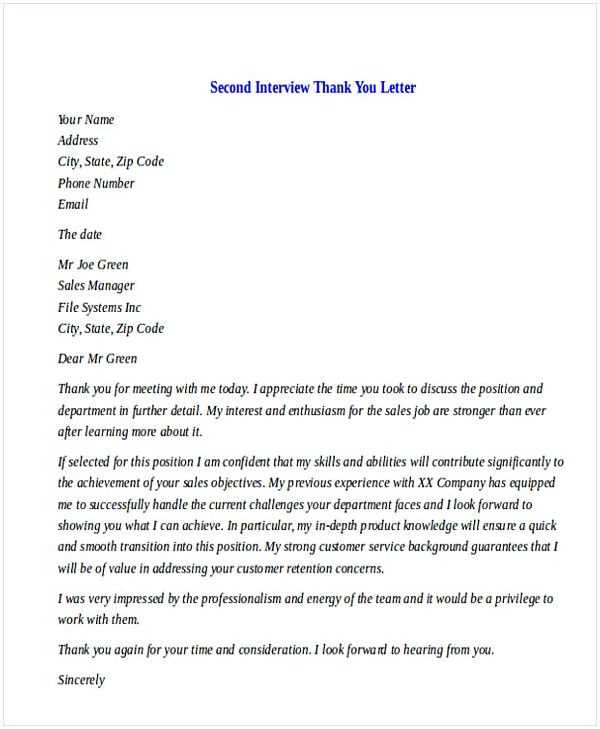
Writing a thank you letter after an interview is a simple but powerful way to reinforce your interest in the role. A well-crafted message can leave a lasting impression, showcasing your gratitude and professionalism. Make it personal, specific, and timely to increase your chances of standing out.
Personalize your message: Start by addressing the interviewer by name. A generic “To whom it may concern” lacks impact and does not show the attention to detail that employers appreciate. Referencing specific points from the interview will demonstrate your engagement and enthusiasm for the opportunity.
Express gratitude and reinforce your interest: Acknowledge the time the interviewer spent with you and mention aspects of the conversation that solidified your desire to join the team. This not only shows appreciation but also reinforces how your skills align with the job at hand.
Keep it concise: A thank you letter should be brief but meaningful. Avoid long paragraphs and focus on key points: thank the interviewer, highlight a key discussion from the interview, and express continued enthusiasm for the position.
Here are the revised lines:
When crafting your post-interview thank-you letter, keep the tone polite but concise. Here are some effective adjustments for clarity and impact:
1. Be Specific About the Conversation
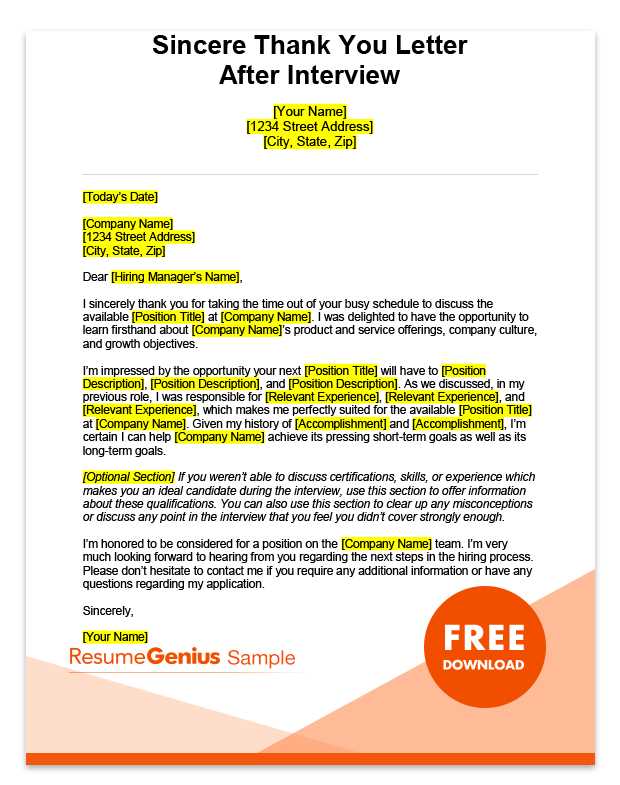
Instead of generic expressions like “I enjoyed our conversation,” provide details that highlight a specific topic discussed. For example:
- Original: “It was great talking with you about the company’s values.”
- Revised: “I appreciated learning more about your approach to customer satisfaction and how the team prioritizes client relationships.”
2. Express Your Continued Interest
Avoid vague phrases. Let the employer know you’re still interested in the position by directly mentioning how you see yourself fitting in:
- Original: “I would love to work at your company.”
- Revised: “I’m excited about the opportunity to contribute to your team and leverage my experience in project management to support your upcoming initiatives.”
Being clear and direct makes your gratitude come across as genuine and thoughtful, helping you leave a lasting impression.
- Post-Interview Thank You Letter Template
After your interview, send a thank you letter that reinforces your enthusiasm for the position. Keep it concise and personalized, highlighting specific moments from the interview that stood out to you. This shows you were engaged and appreciate the opportunity.
Start with a clear subject line such as “Thank You for the Interview.” Address the interviewer by name, and express gratitude for their time and consideration. Mention something specific you discussed that excites you about the role or company, demonstrating your genuine interest.
Reiterate how your skills align with the position and how you can contribute to the company’s goals. This helps remind the interviewer of your qualifications and enthusiasm without being repetitive from your interview.
Close by thanking them again and expressing your hope to continue the conversation. Keep your tone warm and professional. Sign off with a respectful closing like “Sincerely” or “Best regards,” followed by your full name and contact details.
Make your thank you note stand out by including details from your conversation. Mention a specific topic you discussed, such as a project or goal that excites you, to show you’re genuinely interested. Reference a personal connection you made, whether it’s a shared interest or insight you gained. This adds authenticity and shows that you paid attention during the interview.
Include a brief mention of a key skill or experience that aligns with the role. For example, “I was excited to hear about the opportunities for growth in project management, as my experience with leading cross-functional teams could be a great fit.” This reinforces your qualifications without sounding like a generic statement.
Tailor your closing line to the tone of the interview. If the conversation was casual and friendly, you might end with something like, “I look forward to staying in touch and hope to hear from you soon.” If the interview was more formal, a professional closing like, “Thank you once again for your time and consideration,” is fitting.
Personalization shows thoughtfulness and reinforces why you’re the right fit. Take the time to make each note unique to the interaction you had.
Key Elements to Include in Your Thank You Message
Start by expressing gratitude. A simple and clear statement like, “Thank you for taking the time to meet with me today” makes your appreciation known right away.
1. Personalization
Reference something specific from the interview to show you were engaged and are genuinely interested in the role. Mention a project or idea discussed, or a detail that stood out to you about the company.
2. Reaffirm Your Interest
Clarify why you’re excited about the role and how your skills align with the position. This reinforces your commitment and enthusiasm, making you a more memorable candidate.
3. Brief Recap of Key Points
Include a sentence or two summarizing how your strengths relate to the role. This reminds the interviewer of your qualifications and the value you would bring to their team.
4. Call to Action
End your message with a polite follow-up request. This could be a note expressing your eagerness to continue the conversation or asking when you can expect to hear back about next steps.
5. Professional Sign-off
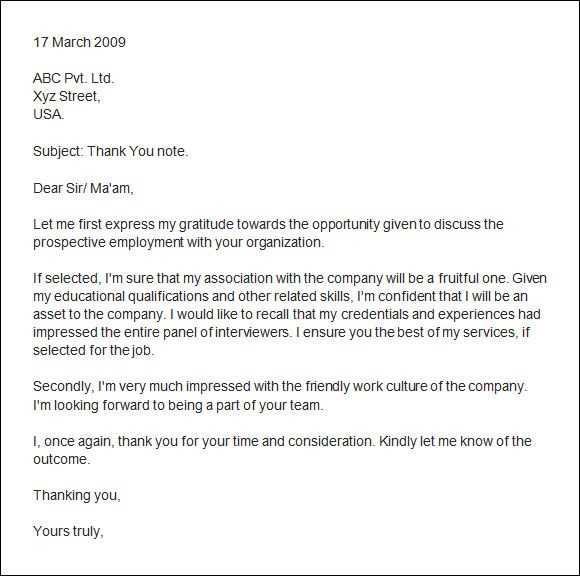
End your message professionally, such as “Best regards” or “Sincerely,” followed by your full name. Keep it concise but courteous.
Send your thank you note within 24 hours after the interview. This shows your enthusiasm and helps the interviewer remember your conversation while the details are still fresh. A prompt response indicates your professionalism and strong interest in the position.
Morning vs. Evening: Timing Matters
Sending your note in the morning, ideally before noon, increases the chances of it being seen quickly. Email inboxes tend to get busier later in the day, which might delay your note’s visibility. A well-timed message can make a strong first impression.
Consider the Weekend
If your interview takes place on a Friday, aim to send your thank you note before the weekend. If that’s not possible, consider sending it on Saturday morning. Waiting until Monday could make your note feel less urgent and might diminish its impact.
Common Mistakes to Avoid in a Thank You Letter
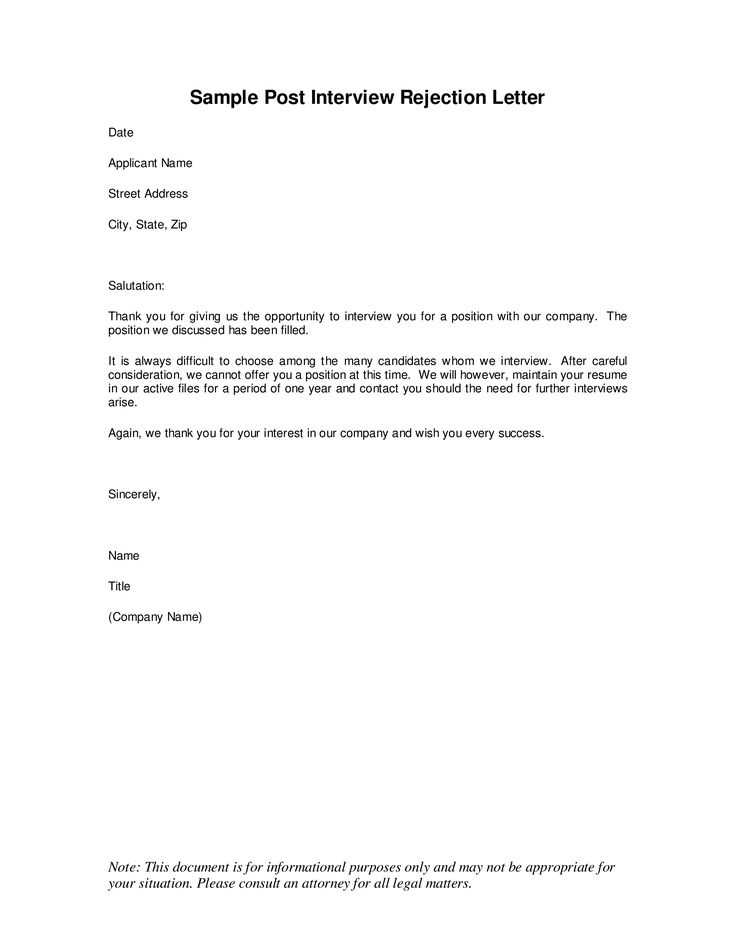
One major mistake is writing a generic letter that lacks personal details. Tailor your message to the conversation you had during the interview. Refer to specific points discussed to show your genuine interest in the position and company.
Avoid being overly formal or stiff. A thank you letter should be professional but still reflect your personality. Try to strike a balance that feels natural, rather than reading like a template.
Don’t repeat your resume. The thank you letter is not the place to restate your qualifications. Instead, highlight the unique aspects of your interview, such as a specific skill or experience you discussed that aligns with the role.
Keep it concise. A thank you letter shouldn’t be long. Aim for a few well-crafted paragraphs that express appreciation without becoming overly verbose or redundant.
Another common mistake is neglecting to proofread. Errors in spelling, grammar, or punctuation can create a negative impression. Always read through your letter carefully before sending it.
Avoid sounding desperate or excessively complimentary. While expressing gratitude is important, overdoing it can come across as insincere. Stay professional and authentic in your tone.
| Mistake | Why to Avoid It | How to Fix It |
|---|---|---|
| Generic message | Feels impersonal and lazy | Personalize with specific details from the interview |
| Being overly formal | Sounds stiff and disconnected | Find a balance between professionalism and warmth |
| Repeating your resume | Redundant and unnecessary | Focus on what you learned during the interview and your fit for the role |
| Being too long-winded | Risk of losing the reader’s attention | Be concise and to the point |
| Neglecting to proofread | Errors can damage your credibility | Read over your letter and use tools to catch mistakes |
| Overpraising | Comes off as insincere | Express gratitude in a genuine, balanced way |
Respond directly and concisely to any follow-up questions. This shows your willingness to provide additional details and clarify any doubts. Always start by acknowledging the question, and then explain your point with clear examples or specifics.
1. Be Clear and Specific

When addressing a question, provide clear and detailed information. Avoid vague answers. If the question pertains to a project or experience, offer concrete examples or metrics to back up your response. This makes your explanation more convincing and grounded in real scenarios.
2. Confirm Understanding
If the clarification seems unclear, ask the interviewer to specify their question or provide additional context. This ensures that your answer directly addresses their concern and prevents misunderstandings.
- For example: “Could you clarify what you mean by…?”
- “I want to ensure I answer this correctly, could you expand on your question about…?”
Such responses make the conversation flow more smoothly and demonstrate your attentiveness to details.
3. Show Appreciation for the Question
When responding to follow-up questions, thank the interviewer for asking. This reinforces your positive attitude and readiness to engage in further dialogue.
- “Thank you for bringing that up. Here’s a more detailed explanation…”
- “I appreciate you asking about this. Let me explain…”
This simple gesture helps maintain a friendly, professional tone throughout the communication.
Send an email when you need to express gratitude quickly. Emails are best for situations where you want to acknowledge the interviewer’s time and maintain momentum, especially after a phone or video interview. A fast response shows your enthusiasm and professionalism. Aim to send your email within 24 hours.
On the other hand, a handwritten thank you letter works well when you want to stand out in a more traditional or formal setting, or when the company culture leans toward personalized communication. Letters add a personal touch and demonstrate thoughtfulness, which may be appreciated after in-person interviews or for roles in industries such as law or academia. It’s ideal to send the letter within a day or two after the interview.
Considerations for Choosing Between a Letter and an Email
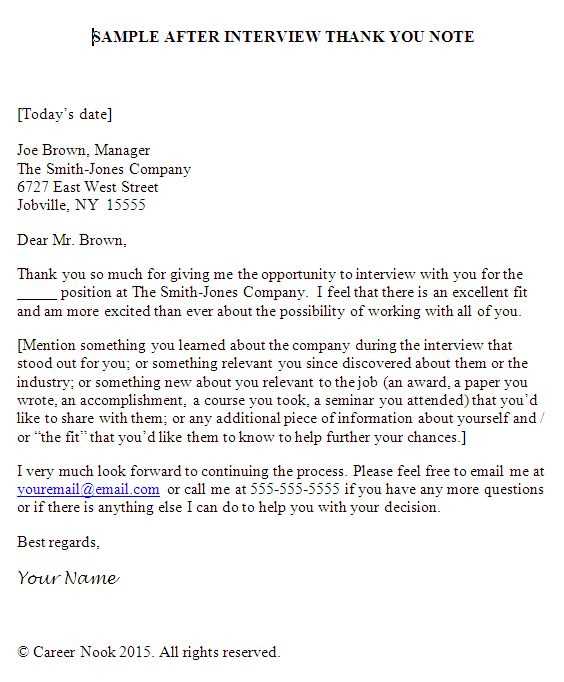
| Criteria | Thank You Letter | |
|---|---|---|
| Speed of Response | Fast, sent within 24 hours | Sent within 1-2 days |
| Formality of Industry | Appropriate for most industries | More suitable for formal sectors (e.g., law, academia) |
| Impact | Quick, shows enthusiasm | Personal, adds a thoughtful touch |
| Preferred Medium | Common in modern, tech-driven industries | Preferred for more traditional roles |
How to Conclude Your Post-Interview Thank You Letter
Close your letter with a statement that reinforces your enthusiasm and appreciation. A strong finish can leave a lasting impression. Keep it concise, but make sure it reflects your genuine interest in the role. A sentence like, “I look forward to the possibility of contributing to your team and continuing our conversation soon” works well. Avoid being overly formal; show your personality and eagerness without being too intense.
Be Specific About Your Enthusiasm
Instead of a generic “thank you,” mention something specific you enjoyed during the interview. It could be a part of the job that excites you or a particular conversation point that resonated. For example, “The opportunity to work on XYZ project excites me as it aligns perfectly with my experience and goals” helps the hiring manager remember what sets you apart from other candidates.
Leave the Door Open for Follow-Up
Close with an invitation to connect again, signaling your interest while keeping it casual. “Please let me know if you need any additional information or if I can answer any questions” works as a polite and open-ended way to keep the conversation flowing.